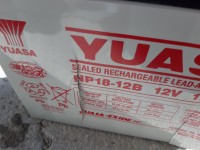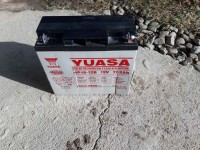Hi
I have such a problem. Please advise.
I used a Yuasa lead-acid battery. he was about 3 years old
It was connected as a support for the alarm system in a single-family house.
I didn't see him for several months.
Recently, after checking, it turned out that the battery swelled up to such an extent that the housing cracked (photo).
I'm quite a beginner in this topic, so I'm curious if this behavior of the battery happens? What could be the reason?
I have such a problem. Please advise.
I used a Yuasa lead-acid battery. he was about 3 years old
It was connected as a support for the alarm system in a single-family house.
I didn't see him for several months.
Recently, after checking, it turned out that the battery swelled up to such an extent that the housing cracked (photo).
I'm quite a beginner in this topic, so I'm curious if this behavior of the battery happens? What could be the reason?





